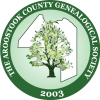On our FAQ (Frequently Asked Questions) page, we continually make every effort to answer questions our visitors and subscribers might have about genealogy in general and what we can do to help the researcher. If you have a question that isn’t answered here, feel free to contact us with your question and if it is relevant, we will post it here with our answer.
General Research
The general rule is always start with what you know. Talk with older members of the family and write down the names and places they remember. Get all the information you can – names, places, dates, etc. The LDS genealogy website has a number of blank forms that you can print out and use while gathering the data. In addition, go through old family photograph albums; if the photos are labelled with names and/or dates, great. If not, perhaps someone will know who it is. You might be fortunate enough to find someone who can not only identify the person, but who can also regale you with stories about the person in the picture. I find it particularly fruitful to have a cassette recorder running while we go through the album. The stories are great. For additional suggestions, the LDS website has a Research Guidance section.
Once you have first-hand information from people that were there or knew the people in question, look in the census records, not only to expand on the data you’ve gathered, but also to verify it (recollections are not always perfect). The federal census was first taken in the US in 1790, and then every ten years after that. The first Candian census was taken in 1871, and then every ten years afterwards. But these are just the federal censuses; there were also special censuses taken. Quebec conducted several throughout the 1600s. Maine conducted a special census in 1837. The first New Brunswick census was taken in 1850. The respective National Archives (in Washington and Ottawa) has the results (to varying degrees) of the federal censuses, as well as information on these special censuses. If Washington is not convenient, there are other sites of theAmerican National Archives that might be closer; and many of the records of the National Archives of Canadaare also available at the Provincial Archives in the provincial capital cities, if Ottawa is too far out of the way. And don’t forget that your local library should be able to get these records from the Archives through inter-library loan.
The churches tend to have only birth, marriage, and death records. Governments, on the other hand, LOVE to collect data. Fortunately, as long as it’s at least 75 years old or so, it should be publicly available; newer records are protected for privacy reasons. Other data to look for would be border entry records, pension records, civil service records, school records, property records, wills, tax records, and armed service records. (Click on the Vital Statistics link in the menu on the left for information relating to births, marriages and death records.
There are also organizations that require documented lineages for admission. These may be based on a common ancestor (such as the Monticello Society), on a war in which one’s ancestors fought (Daughters of the American Revolution, the United Empire Loyalists’ Association, and the Daughters of the Confederacy), or something about the ancestors (Mayflower Descendants).
Some people seem to expect that they will find complete family trees with all the data they were looking for right there at their fingertips. When they discover that the site consists mostly of pointers to where look for the data, rather than the data itself, they are discouraged and frustrated. Unfortunately, that would make this site unwieldy, difficult to navigate and even more difficult to maintain. Besides, it’s a little like reinventing the wheel. It just makes more sense to suggest places where you can have a good chance of finding the information you want. Not only that, replicating information creates the potential for errors in the transcription and some data collections are protected by copyright.
We do provide links to family genealogy pages as well where you will find family trees and other family information. Just bear in mind that we can’t confirm the veracity of the information so it will be up to you to verify the information.
